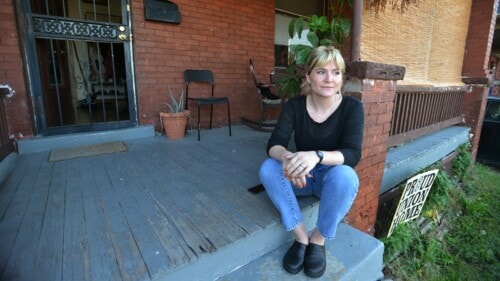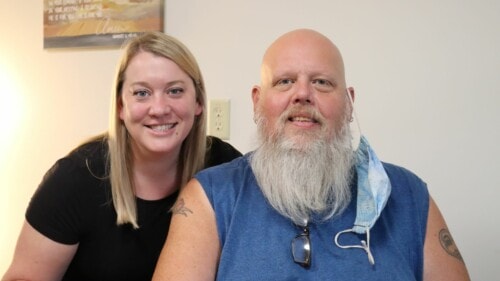For Kansas City’s Low-Income Residents, Code Enforcement Can Put Homeownership Out of Reach First-time homeowner Kenneth Jenkins said he is questioning his decision to buy a house because of Kansas City's strict code enforcement
Published October 20th, 2021 at 6:00 AM
Above image credit: Kenneth Jenkins stands on his front porch along Montgall Avenue where he's been battling neighbors and city code enforcers. (Carlos Moreno | KCUR 89.3)Kenneth Jenkins bought his first home in the summer of 2018. For him, it’s a symbol of the changes he’s made in his life, describing his past as “colorful.”
But sitting on the front porch of his home near 40th Street and Prospect Avenue in Kansas City’s Oak Park neighborhood, Jenkins said he’s had second thoughts. Weeks after moving in, city code violations began piling up.
“That right there is a whole new ballgame, because I’ll tell you what, sometimes I wish I wasn’t buying a house. I’m being dead serious,” Jenkins said. “I mean all the stuff that they want me to sit there and do, man. It’s like you want to nitpick me, for what?”
For many Kansas City homeowners or prospective homeowners, simply buying a house is a big step. Maintaining a home, however, can be a barrier to housing stability — especially for low-income homeowners, who are disproportionately impacted by city code violations.
Jenkins has been cited for several violations, including untagged cars that he’s repairing, wood that he uses to warm his house in the winter and even a rake and barrel he left in his front yard.
He said these are all things he was trying to do to to save money.
Jenkins said keeping up with the maintenance the city expects is demanding, both physically and financially. He said he just doesn’t have enough money or time to keep up.
“You work all day, you come home and you get pounded out at the house too because if you don’t you’re gonna get a fine that’s exuberant or crazy,” Jenkins said.

Low-Income Homeowners Disproportionately Affected
There are a few organizations in Kansas City that work to help residents in Jenkins’ position. One is Jerusalem Farm, a volunteer organization that repairs homes for low-income families in the city’s Historic Northeast.
Program Director Jordan Schiele said Jenkins is far from alone in his housing woes.
He said low-income homeowners are often the target for code violations since many lack the resources to maintain their homes according to city standards. And once they receive a citation, they face the city’s timeline for cleaning up or repairing their property — or they could end up in housing court.
Schiele said the infractions can also create a cycle where homeowners will make repairs or clean up their property only to be cited for another violation when code enforcement officers return to follow up.
“It doesn’t actually help them access resources, it just drains them of the resources that they have,” Schiele said. “When they pay fines, they have to take time off of work to go to court, which oftentimes are hourly jobs.”
City code citations fall into two categories: nuisance or property violations. Those with nuisance violations, like illegally parked cars, trash on their property or overgrown grass and weeds are given 10 days to clean up. Homeowners who have property violations like peeling paint or broken windows have 30 days to make repairs.
With labor and supply costs surging during the pandemic, Schiele said it can be a challenge to find the money and resources to meet the city’s standards in such a small window of time.

Brandon Mason, managing attorney of economic development with Legal Aid of Western Missouri, works with neighborhood associations to address blighted and abandoned properties.
He said investing money in their homes isn’t a real choice for some homeowners.
“Fixing up your property and beautification is, in many ways, a luxury reserved for those who have extra income to do that,” Mason said. “If it’s a question of keeping your lights on, or putting on new paint, it’s kind of a no-brainer.”
Complaint-Driven System Pits Neighbors Against Neighbors
Homeowners often end up with code violations at the hands of their own neighbors. City code enforcement is a complaint-driven process where people report properties to the city’s 311 line.
Schiele said residents who call 311 hoping to improve their community may not even realize what they’re putting their neighbors through.
For his part, Jenkins said knowing his neighbors are making complaints about him just makes him feel bad.
“All it does is it makes the person feel like you stabbed me in the back and I stabbed you in the back,” Jenkins said.
There’s no way to know who is reporting violations since 311 reports can be made anonymously. Schiele said that leads to a lack of accountability for those who use 311 irresponsibly or to retaliate against neighbors after a dispute.
John Baccala is the community liaison for Kansas City’s Neighborhoods and Housing Services Department. He said regardless of the intent of the complaint, city code enforcers are required to respond to 311 reports.
He said enforcement officers work with homeowners on their violations before turning to housing court. He said they try to see that progress is being made, with court being a last resort for those who don’t comply.
“Our ultimate goal is to keep neighborhoods beautified and to get problems addressed before they get out of hand,” Baccala said.
Baccala said housing court takes into account that some people may not have the resources to maintain their property. He said judges can use their discretion to connect homeowners with nonprofits like Jerusalem Farm or the Municipal Court Fund to give them more time to resolve violations.

A Better Model for Resolving Code Citations?
Mason said the city could channel its resources directly toward helping homeowners fix their homes, rather than penalizing them.
If they are unable to maintain their property because of a lack of money, Mason said fines will only make it harder for them to comply with city code.
Schiele agreed — that’s why he thinks a community-based system is a better approach.
Jerusalem Farm participated in a pilot program last year that paired it with a neighborhood association to handle all of the 311 calls for the Indian Mound neighborhood in Kansas City’s Historic Northeast. By working directly with residents, he said they were able to handle 80% of complaints without resorting to fines.
Coming Thursday on Kansas City PBS
Patricia Hernandez, president of the Indian Mound Neighborhood Association, said that avoiding financial hardship for families was critical for her community.
“Our median income is only about $28,000 and so if you have small minor home repairs that are going to cost even $100, or even a little bit more, that’s something that’s not feasible for some of our families,” Hernandez said.
The city has a similar initiative with Northland Neighborhoods, Inc., but Schiele said he’d like to see these programs across the city since different neighborhoods have different needs.
“We were dealing with different cultures, we’re dealing with different people. And so I think when you have community-based organizations, they know what’s best for their community,” Schiele said.
There are a lot of barriers to owning a home in Kansas City — from getting a loan to finding a house at a reasonable price.
For first-time homeowner Jenkins, buying a house turned out to be just the first step towards housing stability. But if he can’t survive the pile of code violations, that could change.
Jodi Fortino is a reporter for KCUR 89.3, a member of the KC Media Collective.






